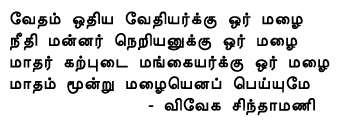
"Nellukku Iraitha Neer Vaaikaal Vazhi Odi
Pullukkum Aangae Posiyumaam - Tholl Ulagil
Nallaar Oruvar Ularael Avar Poruttu
Ellaarkkum Peyyum Mazhai"
-Avaiyar
meaning, The water that flows in a stream to irrigate the paddy also irrigates the weeds around. Likewise, for that one good person on this old earth, it rains for the benefit of all. Now the interlingual rendition,
Nellukku - (possesive case of) Nell - Paddy
Iraitha - Poured, Irrigated
Neer - Water
Vaaikaal - Stream, a shallow passage for water to flow
Vazhi - Path
Odi - Run
Pullukkum - For the grass (Pull), in this context, weed
Aangae - There
Posiyumaam - Flow, Drip
Tholl Ulagil - Old (Tholl) Earth - (Ulagu)
Nallaar - Good persons
Oruvar - (denoting count of persons) One
Ularael - Ula - Exist ; in conjunction with Oruvar - if one such person exists
Avar Poruttu - Avar: Them, respected tone of a single person; Poruttu - For a particular purpose
Ellarkkum - For all (Ellar)
Peyyum Mazhai - pour down, used in conjunction with rain (Mazhai)
Hmm, interesting, now lets see what Vivega Chinthamani has for the rains. The first song goes like this

"Vedham Odhiya Vedhiyarkku Ore Mazhai
Needhi Mannar Neriyanukku Ore Mazhai
Maadhar Karppudaya Mangayarkku Ore Mazhai
Maadham Moondru Mazhaiyena Peyyumae"
Needhi Mannar Neriyanukku Ore Mazhai
Maadhar Karppudaya Mangayarkku Ore Mazhai
Maadham Moondru Mazhaiyena Peyyumae"
- Vivekaga Chinthamani
The meaning, "A rain for the priests enchanting the Vedhas. A rain for the king who follows good virtues and upholds justice. A rain for the women who maintain their chastity. So in all three rains a month". As usual, the interlingual rendition
Vedham - Vedhas
Odhiya - Enchanted, Recited
Vedhiyar - Priests or persons following the Vedhas
Ore - One
Mazhai - Rain
Needhi - Justice
Mannar - (plural of Mannan) Kings
Neriyan - Follower of good virtues
Maadhar - (plural of Maadhu) Women, normally used in a collective sense
Karppu - Chastity
Mangayar - (plural of Mangai) Women
Maadham - Month
Moondru - Three
Peyyum - downpour, fall (esp rain)
This above song is a representation of the fact that if the good deeds grow and good virtues are upheld, the nature will bestow good rains that will help the planet flourish with all good things. Now, here the opposite where if good deeds dwindle, then nature punishes those act. The following song can be interpreted in two ways, one as nature grieving the situations that would have caused the persons involved to perform such acts; the other as a punishing measure for those who are expected to follow good virtues but they stray away blatantly.

"Arisi VittridUm Andhanarrkku Ore Mazhai
Varisai Thappiya Mannarkku Ore Mazhai
Purushanai Kondra Poovaiyarkku Ore Mazhai
Varudam Moondru Mazhaiyena Peyyumae"
Varisai Thappiya Mannarkku Ore Mazhai
Purushanai Kondra Poovaiyarkku Ore Mazhai
Varudam Moondru Mazhaiyena Peyyumae"
- Vivekaga Chinthamani
the meaning, "A rain for the priests who sell rice. A rain for the kings stray away from their virtues. A rain for the women who kill their husbands (Rather in the non-literal sense, women who betray their husbands). So in all, three rains a year".
Arisi - Rice
Vittridum - Selling
Andhanarr - Priests
Varisai - Duties, Order, Queue
Thappiya - Escape, Default, Missing to perform duties
Purushan - Husband
Kondra - Kill, Destroy
Poovaiyar - (plural of Poovai) Women
Varudam - Year
Some people say, that the only one of the three rains mentioned in the first song actually happen (A rain for the women who maintain their chastity) and that too not every month. And all the three rains mentioned in the second song occur without fail. I am not sure as to the correctness of the comments. The points in the above two songs of Vivega Chinthamani and in Avaiyar's song bear some correlation - "For the purpose and the benefit of the good, nature will bestow goodness for all."
More to come, until then...
No comments:
Post a Comment